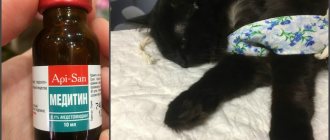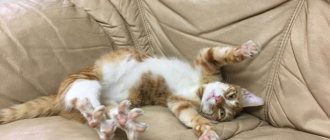The natural stages of life - birth and death - are always nearby. This applies to any living beings inhabiting the Planet. Pets are no exception, and one day a cat owner inevitably faces the death of a pet. Anyone who has an animal at home should know how to understand that a cat is dying and how to help it alleviate its suffering. In some cases, due to incurable and dangerous diseases that cause severe suffering to the cat, it is prudent to carry out euthanasia.
Lifespan of cats
The lifespan of a cat depends on several factors. Animals living on the street live on average up to 5 years, and pets live up to 15 years or more. There is also an intermediate option: the cat lives indoors, but can freely go outside (up to 8 years of life). Previously, cats died faster, but now veterinary medicine and vaccination have grown to such a level that the life expectancy of animals can depend on how the owners care for their pets.
The oldest (still living) cat lives in England; her name is Poppy and she is 24 years old
There are cases where cats lived for more than 30 years. A cat that lived for 38 years was included in the Guinness Book of Records.
A cat lives longer if it is vaccinated on time and correctly. The cat’s health may also depend on whether the animal is castrated (sterilized) in a timely manner. In general, sterilization helps prevent the risk of many diseases. These could be cancer or complications after pregnancy and lambing. In addition, a pet's life lasts longer under good conditions. The owner of the animal can recognize the cat’s illness in time and take the necessary measures to cure it.
Once upon a time my grandmother had a cat, Musya. She was not sterilized and was never vaccinated. Musya gave birth every year. Each litter had at least four kittens. My grandmother's house was in the village, so Musya spent a good half of the day outside. Nevertheless, this cat lived for 19 years.
Signs of a Cat
Signs about cats
- a list of signs about cats. Cat signs. Various signs about cats. Cat superstitions.
CAT
- this is God’s creature given to man to help, a cat gives life, well-being and most importantly health - it does this unnoticed by us every day and ensures a calm old age. A cat absorbs and processes bad human energy - that’s how it’s designed. If a cat rests on some part of your body, never push it, it will ease the tension in that part of the body and go away on its own. It is also not recommended to hold a cat if it wants to get away from your hands. Cats feed off human energy, taking all the bad things into their own backbone.
According to popular superstitions, the cat is at the disposal of the brownie. Therefore, they get a cat of the same color as the hair color of the owner of the house. Otherwise, according to popular superstition, the brownie will dislike the animal and will drive the animal out of the hut, constantly throwing it off the stove.
According to signs - kill a cat / no luck in anything for seven years.
According to popular belief, “letting a cat die in the house means inviting trouble into the house.” That's why cats that love their owners leave home before they die.
The acquisition of a cat is accompanied by a variety of magical actions: you cannot buy a cat, you can receive a cat as a gift, or exchange it according to signs for a chicken egg. If a cat gives birth to black and red kittens, then the red one should be given away and the black one should be kept for good luck.
Signs of a Black Cat
A black cat crossed the road - to failure in business, trouble. at the same time, the Black Cat protects the house from thieves. If a multi-colored cat has found its way into a house, it promises happiness to its owners. A black cat on board a ship promises good luck.
As long as the fisherman's wife keeps a black cat in the house, the head of the family is not afraid of either storms or hurricanes.
A tricolor cat protects the house from fire and other misfortunes, and its owner will never get sick with fever.
According to signs, when a Cat washes itself, it washes away (invites) guests.
Why does a cat crush a pigeon - bad news that will greatly disappoint you.
A cat is drawn to a person for renewal (or for self-interest).
Common causes of death in domestic cats
Indoor cats often die of old age, while street animals do not have this luxury
If a cat has been living next to a person for a long time (more than 10 years), then old age will begin to manifest itself in its appearance and behavior. If we convert cat age to human age, we can say that a 15-year-old pet lived 76 human years. If a cat dies of old age, it is possible that she is not sick and therefore does not experience pain. This happens often, you just have to accept it. You can recognize the approaching death of an elderly cat by several signs:
- the cat is apathetic and sleeps a lot without leaving its favorite place;
- the animal stops eating and begins to lose weight;
- the cat is unhappy or does not react if you stroke it or pick it up;
- the cat begins to have poor orientation in space (it touches and bumps into objects, corners);
- the animal is breathing heavily, the pupils are dilated, the lenses are cloudy.
No less often, cats die due to disease (healthy animals can die from an accident). The most common disease leading to death is kidney failure. This disease is typical for cats, especially neutered ones. Due to poor nutrition, metabolism is disrupted, leading to urolithiasis. The kidneys fail and the cat dies. It is possible to extend the life of a sick animal only if the cat is young. Prescribing the correct medication and diet are of great importance.
My sister has had a cat, Donut, for three years now. This is a mongrel, but very beautiful black cat. Donut is fed mainly dry food. The cat's favorite food is boiled fish. A year ago, the cat fell ill: he lost his appetite, began to urinate frequently and painfully, and the urine contained blood. The veterinarian said that such symptoms indicate urolithiasis due to an unbalanced diet. After treatment, Donut recovered. All this time the cat is on a diet. He is given less fish, dry food has been replaced with better quality food, and dairy products have been introduced into his diet.
Males are more likely to suffer from kidney failure than male cats
Quite often, furry pets “burn out” from cancer. Perhaps this is one of the most painful diseases. The older the cat, the greater the risk of developing this disease, and the more painful it is. An old animal may suffer for several days. Cancer does not spare the weak. And young individuals can suffer for months. Only surgery to remove the tumor can save a cat with cancer. However, it is not always possible to find such a qualified and caring pet surgeon.
The cat is 13 years old and has a mammary tumor. Today we went to the veterinarian: he said that we need to operate, otherwise it will be flayering. But the cat will survive in 50% of cases, and there will be a difficult recovery period ahead. The extent of the damage will be determined only during the operation, but they already said by eye that it had metastases.
https://m.woman.ru/home/animal/thread/4030448/3/
Some cats die not because of the main tumor, but because of metastases or inadequate treatment. However, in addition to oncology, the cause of death of an animal can be panleukopenia (distemper). This disease kills even a young cat in just a few days. It is very difficult to survive with such a disease. Older individuals can survive if they survive the first 4–5 days after the onset of the disease. Sometimes the disease progresses very quickly: the pet dies abruptly and for no apparent reason. Distemper is just one of many infectious diseases, and there are dozens of them, just like viral ones. Veterinarians are also trying to treat “feline AIDS.” This is the feline immunodeficiency virus. The disease can be asymptomatic for several years. But without immunity, a cat can “catch” any infection, and this will lead to the death of the animal.
Signs of a cat's imminent death from old age
Signs of a cat's imminent death from old age are not as obvious as they seem. Cats are naturally secretive and maintain their composure until the last moment. As soon as the pet gives in, it admits its vulnerability, and in the wild, this equates to death.
Cats older than 7–8 years are considered senior. It is important to distinguish between the concepts of old age and old age. As soon as a cat enters old age, its metabolic processes begin to slow down naturally.
These changes are in no way related to the imminent death of the pet, since there are cases where cats lived to 25–27 years of age. The natural slowing of metabolism allows the body to function longer.
Note! An older cat becomes less active, but continues to eat the usual amount of food, drink water, groom itself, etc.
The only factor that can cause serious harm to the body of an elderly cat and hasten its death is constant stress. Naturally, we are talking about animals that are provided with care and quality feeding.
Stress quickly and rapidly destroys the body, literally slows down metabolism and leads to rapid aging. The concept of aging is usually understood as the process of slowing down the functioning of organs and systems of the body until they stop completely.
A decrease in the activity of organs is indicated by the smell that appears from the cat. The reason for the foreign odor is the accumulation of toxins, which in a healthy animal are removed by cleaning systems. Foreign odors may come from the cat's fur, ears, and paws.
With kidney and liver failure, the animal's breath takes on a sour or metallic odor. If the state of oppression is intensified, the smell becomes more distinct and richer.
Before jumping to conclusions about your pet's imminent death, even if its age is respectful, consult a veterinarian. A depressed and even lethargic state may indicate a disease that can be stopped.
Many older cats suffer from chronic diseases that include the following symptoms:
- Depressed breathing.
- A sharp deterioration in wool quality.
- Decreased heart rate.
- The appearance of a distinctly foul odor of breath.
- Deep yellow urine with a pungent odor.
Note! Symptoms similar to depression before death can occur with infection with tapeworms, infections of the genitourinary tract and oncology.
Do cats leave home to die?
In the wild, a dying cat realizes that it has become vulnerable. Avoiding violent death from the teeth of a predator, the cat looks for a secluded, safe and warm place. If a pet feels this type of dependence, it may deliberately leave the house or hide.
Whether to let a pet go knowing that it will not return is a purely personal decision. Veterinarians recommend not letting very elderly animals out of the house, as they are vulnerable to young cats and dogs.
If, after consultation with a doctor, it is revealed that drug intervention will not lead to relief of the condition and will not prolong life, then the owner has only one thing left - to provide the pet with maximum comfort.
Note! If your pet is experiencing pain or other discomfort, incontinence, inflammation or other ailments, ask your veterinarian to prescribe supportive care.
It is worth understanding that several months may pass from the moment of oppression of the animal’s organs to death. During this time, your pet may experience health difficulties, such as urinary or fecal incontinence.
In this case, the owner needs to think not about his own emotions, but about the well-being of the cat. Expected urinary incontinence is uncomfortable for the owner, but it brings even more suffering to the cat:
- Skin irritation.
- The appearance of ulcers.
- A feeling of inadequacy, in the absence of the ability to take care of oneself and maintain cleanliness.
Important! Even if your pet's death is imminent, your main goal is to provide comfort.
Carefully monitor your pet's condition and take action if pain occurs. Severe pain may be indicated by withdrawn behavior, intermittent or rare breathing, reluctance to move, or complete refusal to eat or drink.
How to understand that a cat is dying
You can tell by the cat's behavior that she is about to die.
A cat that has lived with one owner all its life can “give clues.” A dying animal may become calmer than usual. However, a cat that senses its demise will try to spend as much time as possible with the person. Typically, such “clues” are typical for old cats, for whom death is a predictable event.
Look into your cat's eyes. I was still a child, but I remembered Musya’s face. In recent months, she had become completely thin, her cheekbones became sharp, her fur looked dry, and her eyes became cloudy. But she often lay on my lap for a long time (and not only on me). When they started petting her, she looked into the person’s face. Her eyes seemed large, sad and somehow grateful. Grandmother said that Musya would soon leave home.
In addition to the behavior of an elderly animal, symptoms of the disease may also indicate the approach of death. You should pay attention to the presence of signs:
- redness, peeling of the skin;
- the appearance of bald patches;
- difficulty breathing, wheezing;
- discharge from the eyes, nose;
- increased or decreased temperature;
- blood in the discharge, difficulty urinating or stopping it altogether;
- diarrhea, vomiting.
You can tell when a cat is approaching death by its breathing rate, pulse, and body temperature.
Even if one of the listed symptoms is present, you need to pay special attention to your cat. If you did not know about the disease, it is possible that all is not lost and the cat can be cured. To accurately determine any deviations from the norm, you need to remember the animal’s basic vital signs. The body temperature of an adult cat ranges from 37.5 °C to 39 °C. The older the cat, the closer its temperature is to the upper “bar”. Respiration rate also depends on age. Kittens breathe more frequently (60 breaths per minute) than young cats (22–24 breaths). Adults and elderly individuals breathe least often (17–23 breaths). The pulse in cats is frequent - 100–130 beats per minute (regardless of age).
Some fatal animal diseases are associated with the gastrointestinal tract. In such cases, a specific smell may emanate from the cat (not from excrement, but from the cat). If the disease has not yet manifested itself, you need to examine the animal. If there is a problem with the digestive system, the pet's stomach will be dense and hard. You can contact your veterinarian for diagnosis.
I noticed that there was some strange smell from the kitten, once at night I locked him in the room, and in the morning I went into the room, and the smell immediately “rushed” into my “nose”... It was some kind of specific smell. The kitten smells. I already tried to wash it, but the smell still appeared. He’s so caustic... and I began to notice that I couldn’t stay in a closed space (room) with a kitten for a long time - my head started to hurt, there was pressure on my temple. Although we already have one cat and have never smelled anything from her.
Nimishkina, owner of a sick kitten
https://foren.germany.ru/arch/animals/f/19248865.html
A dying cat may refuse to eat. A weak animal does not eat because it no longer has the strength to do so. A cat can turn away even from its most favorite treat. If a pet dies due to illness, refusing food will only worsen its condition, but it will not be possible to force feed it.
Signs about cats
Dogs are known as man's faithful friends; cats cannot boast of such a title, but this is more than offset by their mystery. What can I say, in every second mystical story these purring soft-paws take a direct part, and in ancient times cats were considered a link connecting our world and the other world. Apparently, this is where so many superstitions about cats came from. We'll talk about the most common superstitions.
Black cat in the house: signs
Everyone knows about the superstitions about black cats, which say that they bring bad luck, and in general it is better not to have them at home or meet them on the road. But as it turns out, this sign exists only among Russian speakers; nowhere else in Europe do they believe in it. Moreover, our ancestors also knew nothing about these signs and gladly allowed black cats into their homes. And before entering a new hut, it was customary to let in a black rooster and a black hen on the first night, and a black cat on the second day. Sometimes they were limited to only a black cat. The choice of animal color is not accidental; it is believed that black fluffies are capable of changing the energy background of a home for the better - the cat will take away all the negative energy accumulated by the previous owner, and will give a charge of positive energy to a completely new hut. It was also believed that a cat was needed by the house for peace and quiet in it, since these animals could best come to an agreement with the “master of the house” - the brownie. And in England and Scotland they still believe that meeting a black cat is great luck, and an animal of this color living in the house will protect the home from robbers.
It is curious that there are so many signs associated with white cats, and indeed any other color does not exist. But if we talk about the combination of colors, then tri-colored cats are considered the most mystical.
Why do cats leave home to die?
If a cat has this opportunity, it will definitely leave the house before it dies.
For as many years as cats have lived next to people, for the same number of years the question has been asked: why do cats leave home? There are many theories about this. Despite its popularity among people, the cat remains one of the most amazing and mysterious animals. Some believe that the cat wants to remain in the owner’s memories as a beautiful and gentle pet. After all, often before leaving the house forever, a cat goes into a person’s arms to say goodbye. The owner may not even suspect that such a surge of tenderness is the last. There is also a theory that cats leave, taking with them the illnesses and misfortunes of a loved one.
When Musya left home, I was sleeping. In the morning the grandmother looked for her, but did not find her. It became clear in the evening that Musya would not return. It's hard to describe, but for many years I believed that the cat carried away some kind of trouble. Perhaps I am still inclined towards this version. After all, it is very difficult to imagine how an adored animal looks for a soft lawn, how it “lays down” and falls asleep forever. It’s easier to imagine your pet healthy and going “off into the sunset.”
People who are more skeptical believe that a dying animal is not thinking about anything like that. On the contrary, from their point of view, the cat does not understand that the end is near. Therefore, they perceive the painful state as some kind of illness that should pass. To prevent humans from interfering with the animal’s healing, the cat leaves the house for a while. However, there is no strength left to return after a walk, so the pet quietly dies alone with itself.
On the eve of death, a cat may push away a person, refuse help and try to leave the home at any cost. The owner may become upset and decide that he must have somehow offended the pet. In fact, a person cannot influence a cat's decision to leave home. And you shouldn’t be offended by her behavior, even if she has become aggressive.
How do cats behave in an apartment when they can’t leave?
A dying cat will try to leave the house as long as it has the strength to do so.
If the cat could not leave the apartment, it will hide. If we consider the theories about this phenomenon in more detail, it becomes clear that in any case the cat wants to be away from the person in the last minutes. An animal may experience pain, and a person may be regarded by it as the source of this suffering. And some believe that the cat is hiding “out of spite” or because it is proud. In any case, a weakened pet will look for a secluded place. The cat will hide in the closet, under the bed or other dark corner.
My cat died last night. He hid deep under the closet, which was unlike him. He lived for almost 10 years, a whole month short of his little anniversary. The terrible fact is that I could not help him in any way.
Artyom, lost the cat with whom he lived for 10 years
https://m.woman.ru/home/animal/thread/4234845/4/
However, there are exceptions to this pattern. Only the cat who has the time to do so can afford the luxury of choosing the last place. Animals that die from an accident do not have this opportunity. However, pets who do not want to die and are not ready to say goodbye to life will try to come home to a person. So a cat hit by a car will crawl towards the house until the last moment.
How do cats die?
Unfortunately, nothing living on this earth lasts forever. Our beloved pets may also die sooner or later. This article will talk about how cats die.
How does death happen?
Cats are very unusual animals. They are credited with even the most mystical abilities. But they also get old and get sick. Why do cats die? From old age and from diseases, many of which are fatal.
When Nellie finally makes her way to the big sunny window sill in the sky, it will be our job to decide what to do with our most beloved Little Miss. When preparing for the sad time that a pet dies, let us talk about how to take care of your friend's end-of-life arrangements. But first, everyone needs to do me a favor.
My mother-in-law is more superstitious than I am, and she has a habit of touching her nose with her index finger once or twice when she talks about a negative hypothetical. As in: “If anything happens to you on this trip, we need to know where your important documents are.” This is her way of saying: “God forbid!” It would make me a lot better if we all did a nose touch while reading this post.
If a cat realizes that something is wrong with it, it begins to hide in the most secluded places, where no one can disturb it. Feeling pain and danger, they try to hide from people and from everything that may perform any unnecessary actions for the cat at the moment. The cat feels pain and is confident that someone has offended it or attacked it, causing pain.
Simple, traditional, culturally significant, burial is a great choice if you have a home and some land. What to consider when burying a pet. Before you do anything, call your local utility office to have your yard marked. If you have the heart and desire, you can decorate it. Think about whether you want to add a favorite toy. Go deep into the grave, at least three feet deep, to prevent odors or break-ins. Prepare a few words. If you didn't say goodbye to your pet, let him know how much he means to you and how much you will miss him. Turn around, remembering something you loved about your pet. Mark the grave: You can place pavers, plant a tree, buy a marker, or create another memorial for your pet.
- The last thing you want to do is break a gas line with your shovel.
- Wrap your pet in cotton cloth.
- If she had a favorite blanket, maybe it would work.
- If your pet is small, place it in a cardboard box.
Problems you may encounter in burying your pet.
She cannot understand who did this, so she prefers to go away from everyone in order to protect herself from some unknown danger. It often happens that a cat dies far from its owners or in a place where it is difficult to find it.
Why does a cat go to die?
Often, owners cannot understand why the animal they cherished leaves home without saying goodbye and dies alone. The cat does not know how to explain what exactly is bothering her and is in enormous pre-death stress. She doesn't need anyone near her. She is not a person and cannot ask for support and an explanation of what is happening to her. If a cat begins to hide from its owners in the most distant and inaccessible places, this is the answer to the question of how to understand that a cat is dying.
This does not mean at all that the cat does not love its owners. She’s just in deep confusion at this moment and the only way out seems to her to be to hide from everyone, including her owners. We are not given the opportunity to understand what a cat feels at the moment of death. After all, everything is different with us. A person is ready for the fact that sooner or later he will have to leave this world, and he understands this if he is seriously ill.
How to care for your pet to ease its suffering
Cats who are about to die need special treatment
If you sense that your cat is getting ready to leave, give it your full attention. The animal may hint that it needs affection (walking into your arms, purring, being caressed, etc.). Some owners, realizing that their furry friend is about to pass away, take time off from work and put off everything. A cat, like a person, will be much calmer if its beloved owner devotes several hours to it and sees it off on its last journey. Cats suffering from fatal diseases do not have the strength to hint. The poor animals suffer until they fall into unconsciousness. They die quietly, without bothering anyone, but even in such cases special treatment is needed.
The cat may not be able to say “thank you for being with me,” but it can feel the presence of a person and his care.
Actually, caring for a cat depends on the circumstances. If your pet is sick, a diagnosis has been made, and any medications are being taken, a veterinarian can give advice. For example, increase the dose of painkiller, put on an IV, etc. But most often, the cat still needs moral support. Some believe that such care is needed not for the cat at all, but for its owner, in order to calm his conscience and not feel any guilt later.
Putting a cat to sleep: humanity or betrayal
If the cat is suffering and does not get up for a long time, then the owner has the right to use the procedure of euthanizing the animal. Each person perceives it differently: some consider it a real betrayal, others consider it as delivering the animal from suffering. However, sometimes the disease drags on, causing unbearable suffering to the cat. This especially applies to animals suffering from urolithiasis or oncology, in which the pet often dies in agony. In this case, the owner must do everything to alleviate the suffering of his four-legged friend. If you decide in favor of euthanasia, first ask your veterinarian if there is any other way to alleviate the cat's suffering.
If your cat is in pain, you need to ask your veterinarian how to alleviate its condition.
Absolutely correct! Of course, humanism should not be confused with a feeling of self-pity. That is, one should not confuse precisely the reluctance to euthanize an animal for medical reasons with the inability to make a decision about this and with the subsequent feeling of guilt.
Olga Zhuikova, owner of the nursery
https://www.svoboda.org/a/377148.html
When our cat got into a fight with a dog, his jaw was broken and his internal organs were damaged. The doctor said that nothing could be done to save him. He suggested euthanasia. But I couldn’t sign the animal’s verdict with my own hands. It seemed to me that since the cat is alive, it means he can recover. The cat eventually left to die, but my conscience remained calm.
Reviews from owners whose cats suffered before death
I put the cat to sleep... when I saw that she stopped eating and began to look sick... she was 17 years old. And if he runs, why? and good appetite? I have a dog (also old) with a small bump on her face and belly... she’s been jumping around for a year and a half now... I’m not taking her to euthanize yet... as soon as I see that she’s in pain and has difficulty getting up, I’ll take her right away.
Martian
https://www.woman.ru/home/animal/thread/3876141/
Take me to a normal clinic, what will they say? I pulled mine out of the other world for a year, kept the IVs twice a day until I got really bad (my kidneys failed), the doctors told me that it would last a maximum of 2 weeks, but the result was a year! Let them recommend medications, there is always a chance to extend the life of your family member a little! You will always have time to put it to sleep.
ovk
https://www.yaplakal.com/forum14/topic736780.html
I took her to another clinic, where at the first examination they said that the cat was going to die (((but they didn’t offer to put her to sleep, they gave her drippings again, gave several injections. They suggested severe poisoning, there was a problem with the intestines. Tomorrow they would take her to drip the kitty again. They gave hope that the cat would not die, and maybe even in the evening he will start to come to his senses
babaka
https://pikabu.ru/story/umiraet_koshka_1610414
Euthanize a dying cat or let it die on its own
Special drugs are used for euthanasia
The decision to euthanize an animal is one of the most difficult. To decide to euthanize your beloved pet, you need to look at the situation from the outside. Even if a dying cat were offered royal terms, she could still die. And sometimes it is no longer possible to look at this suffering, and the most humane way to relieve a cat from suffering seems to be killing. And even if a person clearly understands that pity for a cat is stronger than the reluctance to part with it, it is extremely difficult to decide on such a step. It's always hard to part with a friend about whom there are so many vivid memories. And how much joy he brought when he was little. The pranks once committed by a cat no longer seem like a universal catastrophe, but a trifle. Therefore, after thinking it over again, you need to consult a veterinarian. It is easier for a stranger to soberly assess the situation.
I believe that there is no need to euthanize cats (if a cat has a person, it has a reason to live). Imagine a situation where a loved one is sick. Only a few will agree to euthanasia of a loved one. And this is not selfishness, as many people think. After all, even people with cancer fight to the last, want to live and believe in miracles. But cats (almost the same as people) devote their lives to family, to people. She has earned her right to life, and no one can deprive her of her last minutes, hours, days.
If the decision is made, you need to choose a method of euthanasia:
- The cat is given anesthesia, and after switching off, a drug is given that stops the heart or respiratory activity.
- An injection of ditilin (listenone), a drug that stops the functioning of the respiratory muscles, is given.
The first method is softer. Strong anesthesia causes the cat to fall asleep. While asleep, she does not feel the injection of magnesium sulfate (or ammonia solution). The injection is given intravenously or into the heart. Sometimes after the injection there will be agony, but the cat will not feel anything because she will be unconscious. The second method is tougher: your pet will be conscious until death. After the injection, the cat will begin to choke, will feel it, fight in agony, but will not be able to do anything about it. Euthanasia is carried out in a clinic or at home (for this, a veterinarian is called in advance). You also need to decide in advance what to do with the body (bury or cremate).
Signs associated with the death of a cat
There are a huge number of superstitions about these small animals, because they are long-time companions of humans and are firmly entrenched in all aspects of culture.
Seeing a dead cat on the street
Oddly enough, if a dead cat is found on the street or in another place outside the apartment, there is no need to be afraid or panic. Most superstitions associated with this event call it a good omen.
After such a meeting, financial profit is expected, a trip or a long trip is possible, as well as love or a meeting with an enemy, depending on the color of the animal - it is worth preparing for a fight with the enemy if the cat’s fur is black.
But English fishermen, on the contrary, immediately collected their fishing rods and their belongings as soon as they saw the corpse of an animal. They argued that after such an omen it was impossible to fish, because you could easily run into trouble without getting the desired catch.
If you dropped a dead cat
There are often cases when ill-wishers throw dead animals at the door of an apartment or in the entrances. Most likely, a magical ritual takes place here. If someone wants to harm a family, he has to strangle the cat and throw it to the home of the object of the conspiracy.
Real experienced magicians and esotericists are skeptical about such actions - they are sure that the emphasis is precisely on scaring a person. The mere sight of a corpse on the doorstep makes one feel uneasy, which is why very often the owner’s anxiety turns into the cause of subsequent failures.
What to do after death and how to come to terms with loss
The cat can be buried in a special cemetery for animals or in the backyard (for example, in the country)
To survive a loss, you need to maintain some consistency. First you need to say goodbye to your pet's body. After the funeral, you can mourn the cat. Mourning an animal is useful, it makes it easier for a person to let go of a pet. After this, you need to remove objects that remind you of the cat: toys, bowl, tray, etc. However, all this is just a dry instruction; the person himself must realize that life goes on, and that it is time to let his friend go. Of course, the memories will still remain. But let these be bright and pleasant memories. After a couple of years, love and light sadness should remain in the memory, and not heavy depressing grief.
I remember every cat my family has ever had. Some of them lived long lives, while others died in childhood. We had a white kitten, Bim. He died on the third day from the plague. No one had time to play with him, and no one had time to get used to him. But I remember with a smile how fluffy he was. So fluffy that the ears were not visible in this root, and it looked like a lump. And I really wanted to cuddle him, but my parents forbade him.
Often, to forget about the loss, people get a new kitten. This is a good way to shift attention, but it is not suitable for everyone. In each case, the death of a pet is experienced differently, so there cannot be a single recommendation. To survive this sad event, a person must go through all the stages of grief himself. The main thing is that there is no feeling of guilt. Everything else will be corrected by time, because it heals.
Video: what awaits animals after death
Those who do not adhere to religious beliefs may imagine another option for life after death. On forums about saying goodbye to your beloved cats, you can find phrases such as “walk your furry paws on the rainbow”, “meet me on the bridge”, etc. According to one of the myths, the soul of a pet goes to a better world (cat paradise), which is located over the rainbow. When the time comes, the cat will climb onto the rainbow bridge to meet its owner there.
Signs about cats
Signs and superstitions about cats
Of all the animals once tamed by humans, only representatives of the cat family have retained their independence and, despite their great love for their owner, are not afraid to show their often obstinate, vindictive, capricious or proud character.
However, at the same time, cats are drawn to humans, are ready to stand up for the offended owner and serve faithfully, hunting rodent pests. Why exactly are signs about cats, and not about some other domestic animals, preserved in such large numbers since ancient times, and do not lose their relevance in the modern world?!
When should you get a kitten?
If you want to adopt a kitten after the death of a cat, you need to remember that no one can replace your beloved pet. The new kitten will not be the same furbaby you had before. The new kitten will have its own character and habits. The kitten will become an outlet if only it becomes the object of new love. Taking care of a small animal will make it easier to forget about the loss. But you can’t take a kitten the very next day after the funeral. We need to prepare for the arrival of a new friend at home. If the cat died from an illness, then you need to prepare the apartment. And also purchase everything necessary for the kitten. For example, an adult cat's litter box may not be suitable for a baby.
Yesterday our Barsik died, he was 9 years old, also Siberian... Cancer (he had lymphoma) takes the lives of many pets! Only bring a vaccinated kitten into a disinfected apartment after a year.
Natasha Gordeeva, lost her beloved cat
https://touch.otvet.mail.ru/question/39921908https://touch.otvet.mail.ru/question/39921908
Before you bring a kitten, you need to prepare the apartment
When the apartment is ready, the place for the kitten is prepared, everything necessary is purchased, you need to start looking for the kitten. Many families know in advance where they will take their pet. But not just any animal will do. For example, you cannot take a newborn kitten if you do not have the skills to care for such small animals. The kitten must be healthy and confidently standing on its feet. The animal must also feed itself. If a cat eats only mother's milk, then in the new conditions he will have nothing to eat and will get sick. The age of the kitten is of great importance. It is advisable to adopt an animal aged three months or older.
An important reason why a kitten should be taken home only after three months is vaccination. The first vaccinations are given to the animal at the age of 8 weeks. Revaccination is carried out after 3–4 weeks. That is, a kitten that leaves home later than 12 weeks is maximally protected from various viruses and infections.
https://www.royal-canin.ru/kitten/razvitie-i-vospitanie/v-kakom-vozraste-pokupat-kotenka/
Symptoms and signs of a cat's imminent death from illness
Unfortunately, many owners lose their pets at a young age. The cat may die from illness or injuries. Depression of the body is accompanied by certain symptoms.
An obvious sign of deterioration is a slowdown in metabolism. A natural consequence of slowing down the body’s functioning is oxygen starvation, which is not obvious at first.
Minor oxygen deprivation can be determined by pulse rate. Normally, a cat's heart rate is between 140 and 220 beats per minute. At the stage of chronic weakness and oxygen starvation, the pulse can drop to 60–100 beats per minute.
To measure a cat's pulse, you need to place an open palm on your pet's chest, under the paw:
- Using a stopwatch, determine the number of heart beats in 15 seconds.
- The resulting number of hits must be multiplied by four.
Important! In weak cats, the pulse may not be palpable due to a critical decrease in blood pressure. In this case, you must use a stethoscope or other equipment to measure your heart rate.
In parallel with the decrease in heart rate, the cat's breathing rate decreases. Normally, a healthy cat takes 20–30 breaths per minute. As the heart rate slows, the lungs open less efficiently, leading to oxygen deprivation. With significant oxygen starvation, open-mouth breathing may occur.
Unfortunately, severe weakness and open-mouth breathing indicate that the animal's lungs are partially filled with fluid. Only a veterinarian can make a final diagnosis; at home you can observe the following signs:
- The chest should rise with each breath, if the stomach is swollen and the ribs are almost immobilized, this is a sign of fluid effusion into the lungs.
- Measure the frequency of breaths using a stopwatch (for a minute) - if the cat takes less than 20 calm breaths, this indicates general depression. More than 40 quick, shallow, intermittent breaths indicate a struggle for oxygen, which is bad.
- Wheezing and coughing, accompanied by rapid intermittent breathing, indicate significant filling of the lungs with fluid, and in this case it is more humane to resort to euthanasia (after a detailed examination by a doctor).
Depression of cardiac activity and oxygen starvation is indicated by a decrease in base body temperature. Normally, a cat’s body temperature fluctuates between 38–39.5 degrees. A drop in temperature below 38 degrees indicates a loss of strength and an approaching lethargic state.
To measure a cat's body temperature you need to:
- Use an electronic thermometer - the nose of the thermometer is warmed by the clenched palm to a comfortable temperature, generously lubricated with Vaseline or cream and inserted into the anus.
- If you don’t have a thermometer at hand, your base body temperature is determined by: tactile sensations of the temperature of your ears, eyelids, abdominal skin, nose and gums. A decrease in body temperature may be indicated by a change in the color of the mucous membranes. Normally, a cat's mucous membranes appear bright pink or black (with dark pigmentation). In a lethargic state, the gums become discolored, becoming almost transparent or gray.
In a weakened state, cats usually refuse food and water. If the feeder and drinker remain untouched, it is necessary to monitor the feces. If your cat doesn't drink enough water, her urine will turn deep yellow and have a distinct odor.
Ignoring food is indicated by the absence of bowel movements or slight diarrhea with mucus. Quite often, cats continue to eat but are unable to digest the food. In this case, the pet defecates chewed but not digested food with mucus.
Note! Before death, many animals experience urinary and fecal incontinence.
Reviews from those who have already gone through the death of a cat
There are many reviews online from those who have experienced the loss of a beloved pet.
On any animal forum there are posts about how people dealt with their grief.
When my 12-year-old dog died within six months (I had to be put to sleep due to an incurable disease), and then a kitten (illness), I was terribly worried, I constantly dreamed of them, I constantly cried, I didn’t want anything. Then she picked up a cat on the street, and later adopted a sick little cat from the shelter. Now two healthy, cheerful, handsome men are running around - they have fun and I feel good. And the departed pets will always be in my memory and my heart.
https://m.woman.ru/home/animal/thread/4234845/
Some, in order to survive the pain of loss, began to believe that their four-legged friend was no longer suffering, but lived in a better place.
He must be feeling good. And after some time, I took a small kitten and convinced myself that the soul of my cat had moved into it. Believe it or not, he is very similar in character to that one. True, after 10 years, for some reason, in severe frosts, I still remember my Dima and cry, it seems to me that he is cold there... And you can still reassure yourself that your cat, presumably, has lived his life, and quite a long one at that. , in good conditions, in love... Tell yourself - if he were older, he could suffer from some kind of old age diseases. Maybe the way it happened was for the better, he didn’t experience much pain in his life...
Carrie, found solace in a new cat
https://forum.ngs.ru/board/pets/flat/1908348597/?fpart=1&per-page=50
To make it easier, you need to share your grief with others. Many “comforters” will not find the right words and will say “it’s just a cat” or “don’t cry, you have to move on with your life.” But you still need to share. You need this to free yourself from sadness.
My personal experience: while I was writing this article, I looked through many forums. It is very difficult to read about the grief of others and remember your departed tailed friends. But it's useful. This way you can understand that there are many such people and receive compassion. The tears will dry, and your soul will feel lighter.
Caring for a Dying Cat
When an animal is unwell, it should be placed on a soft bedding or bed. Keep your cat's sleeping area tidy and wash its bedding once a day. If the cat cannot hold back its urine, then place disposable diapers on the bedding. If the cat is powerless and cannot go to the toilet on its own, then you need to carry the animal to the litter box every 3-4 hours. If the cat does not respond to affection and wants to be alone, then there is no need to disturb him.
To ensure that the animal’s body maintains an optimal temperature, you can cover your pet with a blanket and place the bed closer to the radiator. Try to measure your cat's body temperature every two hours. Make sure that neither other animals nor children bother your sick pet. After consulting with your veterinarian, give your cat painkillers. These can be morphine-based drugs (opioids) used for severe pain (Tramadol, Omnopon, etc.), and non-narcotic drugs used for moderate pain (Ketofen, Quadrison, etc.).
Important: if the cat does not eat, then there is no need to force it, occasionally offering food and drink.
How to tell if your cat is in pain
The following signs will indicate that your animal is in pain:
- immobilization;
- screams;
- finding a convenient place;
- unnatural poses;
- detachment, decreased sociability;
- dilated pupils;
- looking at one point, etc.
My cat Freckles is dying now, it’s a damn shame, because she lived in our family for less than 2 weeks for 18 years. A year ago, she began to lose weight, began to sleep more, and generally looked healthy. Literally 4 days ago I started vomiting, stopped eating anything at all, lay down, and didn’t go to the toilet. Now it’s lying next to the radiator, I’m petting it. The twitching has already begun, sometimes she tries to get up in agony, but she has no strength and she falls again. It’s hard to look at this, she is part of our family.. Only one thing calms me down - she lived a long happy life, so it seems to me, but time takes away those close to her. All the best!
Andrew
https://www.woman.ru/home/animal/thread/3948729/7/
On the last day before her death, our cat lay in bed. I sometimes came up and stroked her, which she did not resist. It seems to me that she didn’t care anymore, but I hoped that my affection and participation would help her.
Ways to make a dying cat feel better
Cat owners become attached to their pet and begin to perceive it as a person. To think that the cat experiences the same feelings and suffering. Nobody knows what a cat needs. He endures pain stoically, except for acute pain, when someone bit him or pinched his tail. Maybe the dying cat should be left alone, put something soft on the bed (cats love this), a heating pad (they love it) and not be bothered.
But nothing can be done about human nature. The owner thinks that the pet’s suffering needs to stop. In fact, she is suffering. A person is the owner of an animal and can do whatever he wants with it, except for cruelty, which is punishable by law.
Therefore, the felinologist, who is in a desperate state, has a desire to euthanize the pet. If the disease is incurable, the veterinarian puts the pet into a narcotic sleep, during which the heart stops. The use of muscle relaxants such as Adilin-super or analogues causes death from suffocation within a few minutes. The animal suffers, but the owner does not notice it, since all the muscles are relaxed.
Eliminating negativity
If signs explaining why cats die in the house are interpreted negatively, their effect can be neutralized.
Some rules will help protect your home and family:
- The first thing to do is bury your pet.
- After the burial, wash yourself in the shower or simply wash your face and hands, wishing the bad thing to die out of life along with the water.
- Cleanse the house of negative energy: place a lit church candle and an icon in each room, sprinkle them with holy water while reading prayers. The candles are not extinguished, they are left to burn out.
Important! A new kitten will help you forget about your deceased pet. In the future, a grown-up cat will be able to protect the house from dark forces.
The death of a beloved pet is a difficult experience for the whole family. There is no need to think about bad omens when a cat dies, focusing on superstitions. Positive emotions and a good mood will get rid of negativity and allow you to fully enjoy life.
Stages of death
Death is not an instant, but a process that gradually turns off the body, passing it through the following stages:
- Preagonia - loss of consciousness, cessation of blood circulation, pallor and cyanosis of the skin. This stage can last from several minutes to an hour.
- Terminal pause (preagonia). Breathing practically stops, pressure drops to zero. The oculomotor reflex disappears.
- Agony. Characterized by a lack of consciousness and tactile sensitivity. Breathing may resume and blood pressure may rise. Convulsions may occur.
- Clinical death. Complete stop of all vital processes. When carrying out resuscitation measures, it is possible to “start up” the cat’s body. The duration of the period is about 8 minutes.
- Biological death. This stage is irreversible and is characterized by the complete cessation of all physiological processes in the cat.










